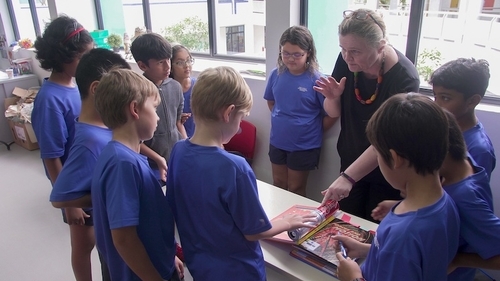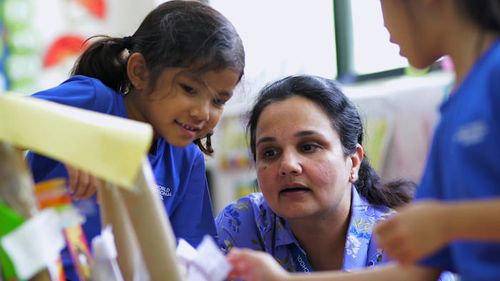At One World International School, we make use of inquiry-based learning, which means we encourage our students to be active participants in the classroom, where they feel comfortable asking questions and exploring topics that interest them, urging them to question anything, even if it isn’t on topic.
In other words, we let children’s natural curiosity be the engine that drives their ability to acquire knowledge. Teachers don’t merely deliver information to his or her class and expect children to react to it. Instead they help students explore the subject in relation to the real world. They are highly trained to enable children to guide their education and to be practical learners. The teachers themselves are also always learning and enjoy hearing ideas from different perspectives.

Energising the Students
Children are naturally curious. In their primary school years, a child’s drive towards understanding the world that surrounds him or her, and their place in it, is unceasing and relentless. They will often ask numerous questions, want to be hands on and to experience things in real time. Their minds are like a sponge and they are constantly absorbing new information. As time passes, children grow to become less eclectic and are drawn towards subjects and spheres they enjoy – they are instinctively self-motivated to learn more about some things than others.
They may prefer the more practical subjects because they enjoy the hands-on approach to learning, or they may love the sciences but struggle with languages. Every child’s tendencies are unique, as is their way of learning. It is our role as educators to recognise these interests and use them to stimulate and direct our students towards deeper understandings. We must ensure that all students reach their goals and milestones in the most enjoyable way. If we can nurture an environment where learning is not a chore, then children will be able to take this love for gaining knowledge with them when they attend university.
The Role of the Teacher
Consequently, the role of the teacher is seen to be a facilitator and guide, encouraging inquiry without dominating the classroom. In presenting a class with their open-ended ‘thoughts’, teachers set an informal and non-challenging tone in which even the most timid of students can have a voice.
At secondary school level, the teacher acts as a manager in this scenario, refraining from the negative effect of criticising or shaping their students’ responses, but rather redirecting the interplay around the class for further thoughts or comments, all of which will later be collected, analysed and recorded. It is important that teachers allow a degree of self-guided learning whilst also ensuring that students are reaching their ultimate potential.

Self-motivation and Working at Home
This type of ‘inquiry-based learning’, when approached with skill, triggers not only curiosity, but the excitement that students experience when they discover that, by drawing from their own personal experiences and sharing their previously learned knowledge, they can be instrumental in not only shaping their own questions, but also in answering the questions of others. At this stage, it is essential to begin researching the ‘topic’ in the classroom, as the presence of the teacher-facilitator is essential. But usually, at around this point, the student becomes self-motivated and can’t wait to continue the investigation process in his or her own time at home.
This is an important aspect of their development as there will be times throughout their lives where they need to take ownership of their learning and skill acquisition. By harnessing this ownership early on they will be more diverse learners who are able to manage their time and education to the best of their ability.
Extending into Other Associated Skills
Analysis and awareness of presentation – in different ways according to the age of the students – are vital skills to nurture. Information, facts, thoughts and personal opinions all need to be identified, categorised and organised, with the assistance of the teacher, into a coherent whole, and the need for this presented via classroom discussions. Expanding communication skills is a core element in all classroom engagements, and the open-ended and informal nature of inquiry-based learning provides an ideal platform from which to develop this.
Our students have the opportunity to work with others from a range of backgrounds and cultures. This means that there will always be a range of ideas, experiences and thought processes within every classroom. This makes for an exciting and eclectic learning opportunity as so many ideas can be bounced around. These classroom experiences give our students the skills that help to make them global citizens.
Natalie D., parent of a primary school student, says, “They like working on their unit of inquiry projects, and they enjoy working on those projects together and with their teacher. My youngest one is working on a lemonade stand with her friends, and she has become the group financial advisor for that project. It’s really nice to see her and the girls empowered with economic literacy at such a young age, this is grade three. They’re able to put their proposal or their plan together, bring it together and serve other students and set an example.”
Read more from Natalie’s testimonial here.
Thinking about Thinking (Metacognition)

Students need to be guided into analysing what they have achieved, and the processes they experienced in their journey. The process itself is an invaluable concept. To be able to identify each stage and reflect upon them is the key to a wider awareness, and being able to understand how they learned, as well as what they learned, is an invaluable life-skill. Personal reflection and analysis is a key life skill that they will use throughout their education and careers. By honing these skills at an early age our students are better equipped for the world ahead of them.
To find out more about our curriculum, Contact us today!
(This blog was originally written in collaboration with Ms Erin Smith, former Senior Coordinator – Primary School & PYP, OWIS Nanyang.)














